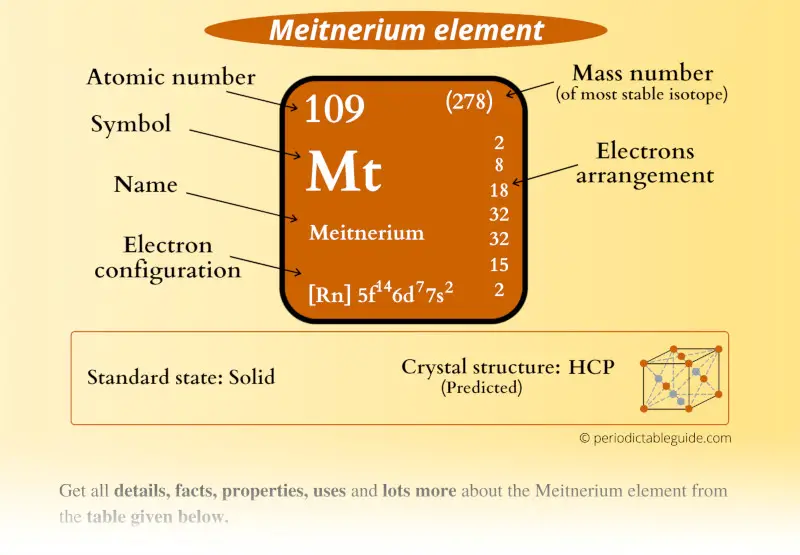
This is a SUPER easy guide on Meitnerium element.
In fact, the table mentioned below is the perfect information box (Which gives you every single detail about the Meitnerium element in Periodic table.)
So if you want to know anything about Meitnerium element, then this guide is for you.
Let’s finish this very quickly.
Meitnerium Element (Mt) Information
| State (at STP) | Solid (predicted) |
| Position in Periodic table | 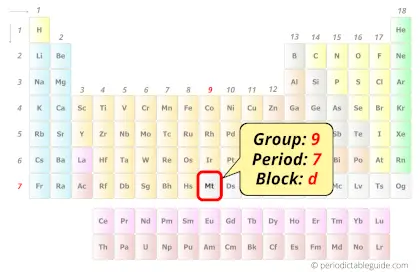 Group: 9, Period: 7, Block: d |
| Category | Synthetic element |
| Atomic number or Protons | 109 |
| Neutrons | 157 |
| Electrons | 109 |
| Symbol | Mt |
| Atomic mass of Meitnerium (most stable isotope) | 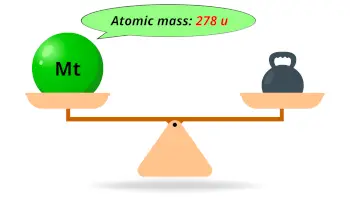 278 u |
| Electrons arrangement or Bohr model | 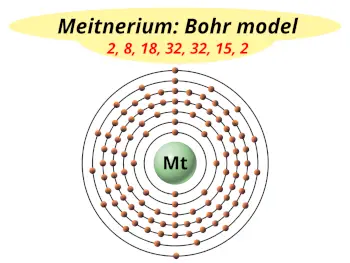 2, 8, 18, 32, 32, 15, 2 |
| Electronic configuration | [Rn] 5f14 6d7 7s2 |
| Crystal structure (predicted) | 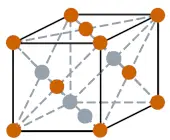 FCC (face centered cubic) |
| Density | 27-28 g/cm3 |
| CAS number | 54038-01-6 |
Meitnerium in Periodic table
Meitnerium element is in group 9 and in period 7 of the Periodic table. Meitnerium is the d-block element and it is a radioactive synthetic element.
| H | He | ||||||||||||||||
| Li | Be | B | C | N | O | F | Ne | ||||||||||
| Na | Mg | Al | Si | P | S | Cl | Ar | ||||||||||
| K | Ca | Sc | Ti | V | Cr | Mn | Fe | Co | Ni | Cu | Zn | Ga | Ge | As | Se | Br | Kr |
| Rb | Sr | Y | Zr | Nb | Mo | Tc | Ru | Rh | Pd | Ag | Cd | In | Sn | Sb | Te | I | Xe |
| Cs | Ba | La* | Hf | Ta | W | Re | Os | Ir | Pt | Au | Hg | Tl | Pb | Bi | Po | At | Rn |
| Fr | Ra | Ac** | Rf | Db | Sg | Bh | Hs | Mt | Ds | Rg | Cn | Nh | Fl | Mc | Lv | Ts | Og |
| *Ce | Pr | Nd | Pm | Sm | Eu | Gd | Tb | Dy | Ho | Er | Tm | Yb | Lu | ||||
| **Th | Pa | U | Np | Pu | Am | Cm | Bk | Cf | Es | Fm | Md | No | Lr |
←Move to: Hassium (Hs) element – Periodic Table
→Move to: Darmstadtium (Ds) element – Periodic Table
Why is Meitnerium in Period 7?
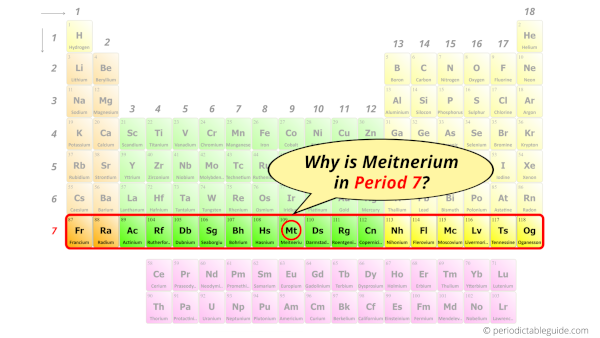
Let me ask you a question.
How many shells does a meitnerium atom have?
It’s 7. Right?
You have already seen the bohr model of meitnerium atom in the above table.
From the Bohr model, it can be found that the number of orbits or shells in meitnerium is 7. Hence, as meitnerium has 7 orbits, it lies in period 7 of the Periodic table.
Why is Meitnerium in d-block?
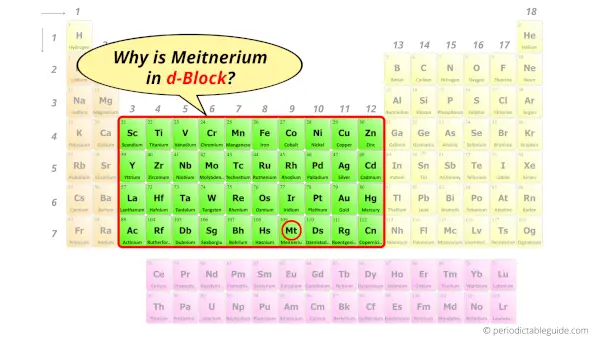
Before knowing this reason, first of all I want to ask you a simple question.
How can you determine the blocks-wise position of elements?
The simple answer: The elements will lie in the s, p, d or f block will completely depend upon the subshell in which the last electron will enter.
For example; the electron configuration of meitnerium is [Rn] 5f14 6d7 7s2.
So the last electron of meitnerium enters the d-subshell or d-orbital.
Hence, meitnerium is the d-block element.
5 facts about Meitnerium
Interesting facts about meitnerium element are mentioned below.
- The element was given the name “Meitnerium” to honor the physicist Lise Meitner.
- Meitnerium was discovered by Gottfried Munzenberg, Peter Armbruster and other team members in 1982.
- Meitnerium is a highly radioactive element and it is not available naturally, but it is artificially prepared in the laboratory.
- There are around 8 different isotopes of meitnerium and all those isotopes are radioactive.
- The isotope 278Mt is the most stable isotope with the half life of only 4.5 seconds.
Properties of Meitnerium
The physical and chemical properties of meitnerium element are mentioned below.
- Meitnerium is an extremely radioactive element and it has a very short half life.
- The meitnerium element has a solid phase at STP.
- The predicted crystal structure of meitnerium is FCC (face centered cubic).
- The estimated atomic mass of the most stable isotope of meitnerium is 278 u and its estimated density is 27-28 g/cm3.
- It is predicted that the meitnerium shows various oxidation states like +6, +3 and +1. The +3 oxidation state is most common in aqueous solutions.
Uses of Meitnerium
Meitnerium is generally used for scientific research work. There is no commercial use of meitnerium as it is extremely radioactive and its production is also expensive.
Explore our New Interactive Periodic Table (with Rotating Bohr Models and More)
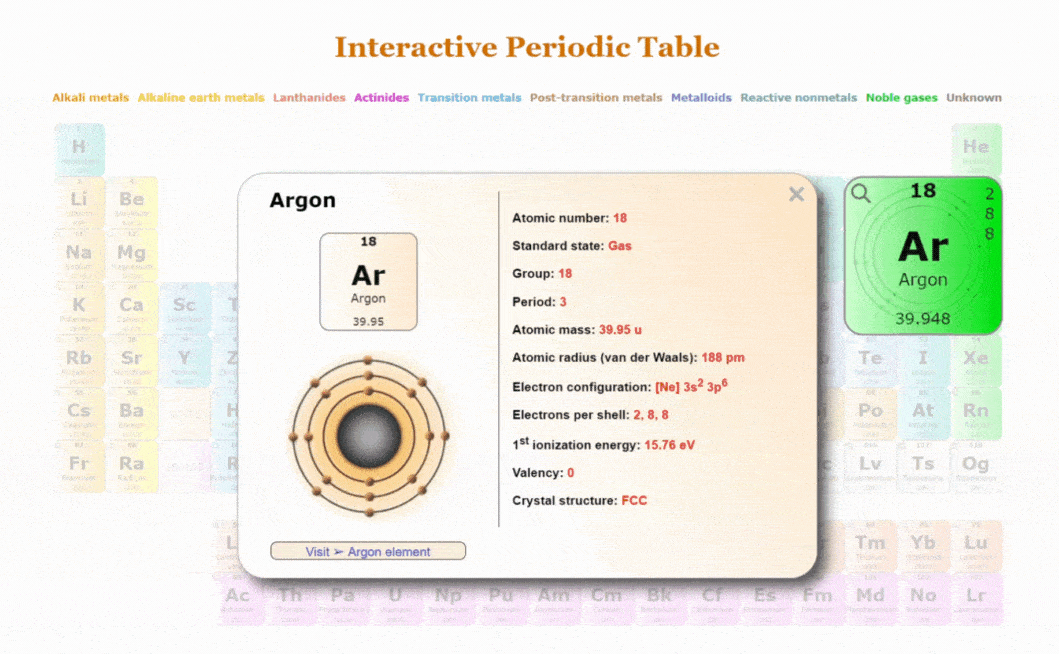
Details about this Periodic table:
- Access detailed info on all elements: atomic mass, electron configurations, charges, and more.
- View rotating Bohr models for all 118 elements.
- Get a free HD image of the Periodic Table.
Note: For future use, bookmark this Periodic table or visit “PeriodicTableGuide.com”
External resources:
- Meitnerium – Element information, properties and uses | Periodic Table. (n.d.). Meitnerium – Element Information, Properties and Uses | Periodic Table. https://www.rsc.org/periodic-table/element/109/meitnerium
- Meitnerium – Wikipedia. (2012, November 12). Meitnerium – Wikipedia. https://en.wikipedia.org/wiki/Meitnerium
- P. (n.d.). Meitnerium | Mt (Element) – PubChem. Meitnerium | Mt (Element) – PubChem. https://pubchem.ncbi.nlm.nih.gov/element/Meitnerium
- It’s Elemental – The Element Meitnerium. (n.d.). It’s Elemental – the Element Meitnerium. https://education.jlab.org/itselemental/ele109.html
- Periodic Table of Elements: Los Alamos National Laboratory. (n.d.). Periodic Table of Elements: Los Alamos National Laboratory. https://periodic.lanl.gov/109.shtml
